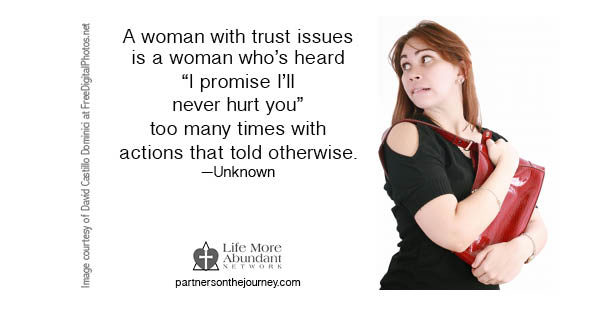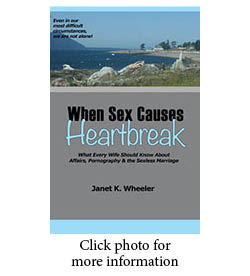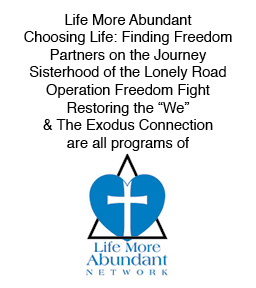Trusting has been a problem in my life. How about you?
I’ve trusted the wrong people and have gotten deeply hurt. I’ve been betrayed by those who told me they would love me forever. My solution, like so many of yours, was to decide I didn’t dare trust anybody.
That decision made me overly cautious, highly suspicious, and very alone. And, as some of you may have discovered, there’s pain in that, as well.
WE’RE ALL IN THE SAME BOAT
Let’s get honest. Who hasn’t been let down by a friend, a business associate, or a spouse? Thankfully, it’s likely you’ve been able to shake off many of those disappointments and move on with your life.
But the betrayal of a husband—that one cuts deeper than any of the rest. Even if they never actually said “I will never hurt you,” it sure seemed like it was a given—an unspoken part of our marriage vows. We never dreamed that this person that once pledged their undying love would ever have the capability of hurting us as deeply as they have in their addiction.
HE WASN’T THE FIRST
Even though our husbands may have hurt us deeper than anybody else, our struggles with trust began long before him.
Isaac Watts, a prominent English minister and hymn writer in the late 1600’s and early 1700’s is often quoted as saying, “Learning to trust is one of life’s most difficult tasks.” There is certainly a measure of truth in his statement, but it doesn’t even begin to tell the whole story.
We all came into this world fully able to trust completely. In truth, we actually had to LEARN to be guarded and distrusting. It wasn’t our natural inclination. It wasn’t how we were made.
But from our youngest years, people disappointed us. They rejected us, they didn’t understand, they didn’t see or meet our needs. We were hurt by their actions (or lack of action) and we started to retract our trust from them.
Contrary to what Mr. Watts said, it’s not learning to trust that is so difficult. It is learning to trust AGAIN that creates such a challenge. The first time was easy. It just came naturally. Trusting after we’ve been wounded . . . well, that’s another story.
THE SIDE EFFECT OF BETRAYAL
One of the most damaging aspects of losing trust with others is that it simultaneously causes us to lose trust in ourselves. We lose faith in our ability to keep ourselves safe. If we missed “the signs” before, how do we know we’ll be able to see them next time? If we’re not convinced we can tell a “bad guy” from someone who would support and encourage us, we begin boarding up our heart from everyone.
Trust is a crucial part of any healthy relationship, whether it be with family, friends or co-workers. A closed heart can’t generate trust, so, one by one our relationships begin to crumble and we eventually find ourselves completely isolated.
Trusting the wrong people has definitely hurt us, but trusting no one will ultimately hurt us even more.
TRUST IS A CHOICE
God made us to function best in community. We will never be truly satisfied in this life without relationships and since relationships cannot survive without trust, if we want to be happy, we have to find a way to restore our ability to trust.
Many would be shocked to realize that trust isn’t a feeling. It is a choice. Even though there are no guarantees that we will never be hurt again, we have to decide that we are going to choose to be a trusting person.
We’re not talking about blind trust. We’re not advocating for putting your head in the sand and denying or ignoring someone’s past errant behavior.
Trust is not about pretending that we were never hurt, or searching until we find that non-existent, perfectly, trustworthy person. It’s about making the decision to risk getting to really know someone’s heart and letting them see ours. It’s about working through problems and hurts.
It’s about giving up the impossible task of trying to keep ourselves from ever getting hurt again and, instead, focusing on learning how to get honest with one another. It’s choosing communication and healing over assumptions and suspicion.
It may not work. If the other person refuses to take the risk to really get to know you and share themselves, you may have to walk away. You may need to seek God for the courage to even step out yourself.
But if you give up and decide it’s too risky, or too much work, you will eventually stop trusting everyone. You won’t be able to trust yourself, or God, or anyone.
Instead of ensuring our safety, this road leads to feeling hopeless and alone. But, when we shift our attention from trying to avoid every being hurt again (which is impossible) and begin to recognize that with God’s help we can traverse anything that comes our way, we gain a new sense of empowerment that allows us to risk trusting again.
“The Lord is my strength and my shield; may heart trusts in him, and he helps me. My heart leaps for joy and with my song I praise him.” — Psalm 28:7
TODAY’S CHAT: Do you struggle with trusting? If so, what is the main thing that keeps you from being able to trust more?



Leave A Response